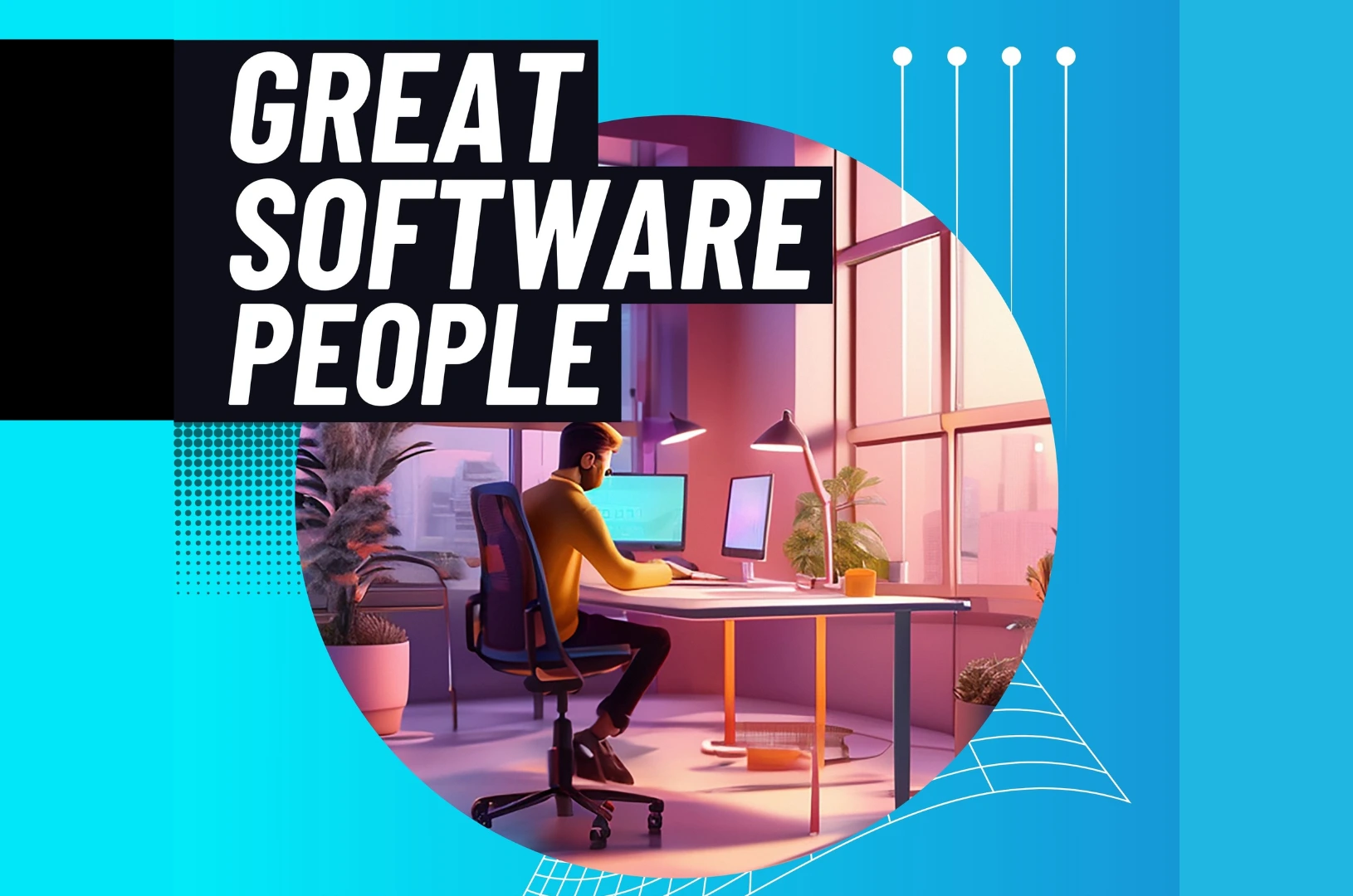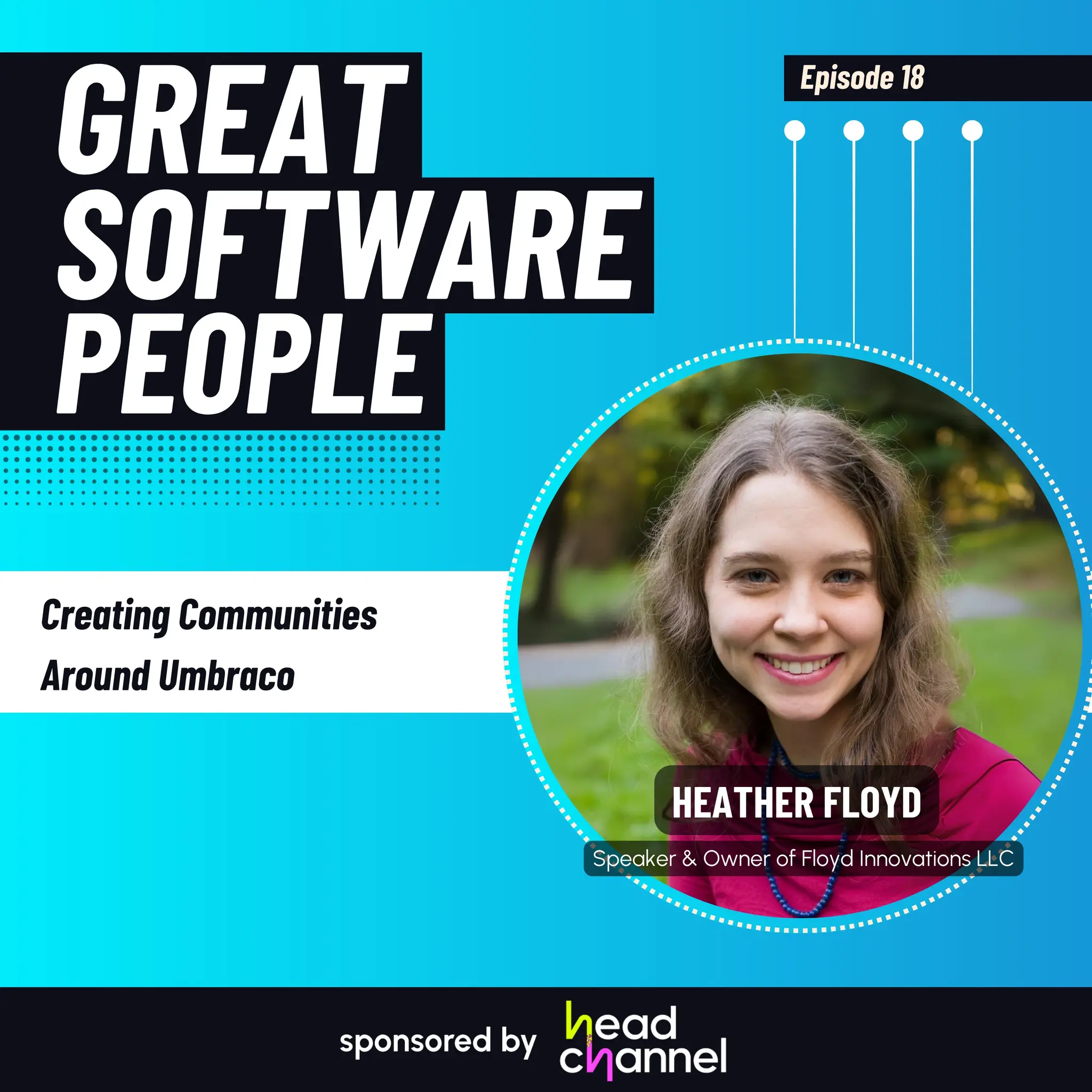
Creating Communities Around Umbraco with Speaker & Owner of Floyd Innovations LLC, Heather Floyd - E18
From humble beginnings with an Access database to a renowned Umbraco expert, Heather Floyd’s software journey is a tad unconventional, but equally extraordinary.
Heather Floyd’s software journey is a tad unconventional, but equally extraordinary. She’s spoken at Codegarden and carved her path in software across decades, so it was a joy to catch up with her at Codegarden 2024 to hear her take on the future of Umbraco, the power of community, and how programming rewires our brains…
This episode covers:
-
How Heather branched into software despite having no initial interest
-
Why stretching yourself is essential to growth and learning
-
Finding community to help when programming becomes a solitary pursuit
-
How programming rewires your brain’s ability to solve problems
-
Heather’s approach to working with sub-optimal clients

Episode highlights
“I started by creating an Access database to manage a process for Lincoln Centre Institute. I was running mail merges out of it and labels and letters. It got crazy. So from there, I just started picking up random little Access jobs, which were surprisingly available.” - 4:30 - Heather Floyd
“Programming is a solitary pursuit in a lot of ways, so you sometimes need the community to feel that validation and make mental leaps forward.” - 14:05 - Heather Floyd
“I think that as a programmer you start to break things down more, or you try to start from a lower level on a lot of problem solving, or just expand your viewpoint a little wider.” - 17:40 - Heather Floyd
“You start to get a 6th sense of who will be what I call a PITA, or Pain In The Ass client, and if they’re insistent to work with you then you can add to your fee for the extra drama.” - 27:10 - Heather Floyd
“Just because Umbraco is open-source, that doesn’t mean it can be a free-for-all. You need to have some curation.” - 30:35 - Heather Floyd
LISTEN HERE:
[00:00:13]
Rich: Welcome to an amazing episode of Great Software People. This one’s a bit different—we’re recording live from CodeGarden, the Umbraco conference! With me today is Heather Floyd, someone instrumental in the growth of Umbraco. Heather, it’s an honour to have you here.
Heather: Thanks so much, Rich! I’m delighted to be here.
[00:00:56]
Rich: So, let’s start at the beginning. Growing up, did you dream of being an Umbraco developer?
Heather: Not at all! I wasn’t into tech, science, or math. My interests were more in arts and literature. In high school, I edited the literary magazine. The internet didn’t even exist when I was a kid, and it was just emerging in my teenage years.
[00:01:45]
Heather: My real foray into tech started in college when I worked an admin job at NYU. They asked me to manage their Access database, and I had no idea what I was doing. I taught myself Access VBA from those big, thousand-page books to automate the work because, like most programmers, I hated data entry. That was my gateway into programming.
[00:03:29]
Rich: From Access databases, how did you transition into web development?
Heather: After tinkering with Access VBA, I moved to VB and then into ASP.NET. Eventually, I realised VB.NET wasn’t as future-proof and shifted to C#. The first web project I worked on involved building an ambitious e-commerce site for a flower shop, but I quickly realised I didn’t have the skills or experience to pull it off. It was a painful learning experience, but it taught me a lot.
[00:07:33]
Rich: How did Umbraco come into the picture?
Heather: Around 2006, I was building a small website for a minister who wanted to blog and post sermons. Writing all the CRUD code myself felt tedious, so I started looking for a .NET-based content management system. I came across three options: Sitecore (too expensive), DotNetNuke (a mess), and Umbraco. I tried Umbraco, and even though it was barebones, I loved its flexibility.
[00:09:44]
Heather: The only catch? You had to learn XSLT to work with Umbraco back then. It was challenging, but the community was a lifesaver. The Yahoo mailing list was my go-to for help, and everyone was incredibly supportive. That community aspect was what kept me engaged.
[00:10:56]
Rich: Speaking of the community, you attended the first-ever Umbraco retreat in the U.S. How did that come about?
Heather: In 2007, Doug Robar, a member of the community, organised a retreat at his home in Louisville, Kentucky. A dozen of us, including Niels Hartvig, the founder of Umbraco, gathered in Doug’s basement to discuss the CMS. It was a turning point for me—I felt a true sense of belonging.
[00:13:32]
Rich: How important is community in development?
Heather: It’s critical, especially in programming, which can be a solitary pursuit. A community helps you solve problems, learn, and feel validated. Without the early Umbraco community, I might not have completed my first project. They were my lifeline.
[00:14:52]
Rich: Do you think joining a community is essential for aspiring developers?
Heather: Absolutely. Communities provide a support system and shortcuts for learning. Plus, programming isn’t just about math or algorithms—it’s about logic, problem-solving, and a willingness to learn. A community can help guide you when you’re stuck and encourage you to keep growing.
[00:19:51]
Rich: After the retreat, how did your involvement in the Umbraco community evolve?
Heather: It wasn’t until 2014 that I truly re-engaged. MindFly, a U.S. agency, organised the first UWestFest, an Umbraco festival in Las Vegas, and invited me to speak. It was my first tech talk, and it reignited my connection to the community. That experience led me to attend CodeGarden and start speaking at events regularly.
[00:23:22]
Rich: Any advice for developers who want to start speaking at events?
Heather: Just go for it! You don’t need a word-for-word script—know your topic well and speak from experience. My approach is to have an outline and talk naturally. It’s nerve-wracking at first, but once you start, the nerves fade, and you get into the flow.
[00:24:50]
Rich: Let’s talk about your current career. You’re independent now—what’s that like?
Heather: I love the freedom of being my own boss. I work with long-term clients and take on projects where I can add value. Working in agencies and in-house before going independent taught me the value of my skills and how to price my services appropriately.
[00:28:50]
Rich: Any advice for those considering going independent?
Heather: Know your worth, and don’t be afraid to say no to bad clients. Specialising in a niche like Umbraco helps, as does building a strong reputation through blogging, speaking, and community involvement. It takes time, but it’s worth the effort.
[00:30:33]
Rich: What’s next for Umbraco?
Heather: The future is bright. Umbraco has matured significantly, and the company is balancing community values with professional development. While the CMS has become more complex, it’s also more powerful. I think the key is maintaining accessibility for new developers while continuing to innovate.
[00:32:05]
Rich: Heather, thank you so much for being an incredible guest, especially in this live setting at CodeGarden.
Heather: Thank you, Rich—it’s been a pleasure!

Contact us.
If you need a partner in software development, we're here to help you.
We will respond to your enquiry immediately.